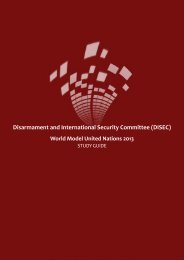Social, Humanitarian and Cultural Committee (SOCHUM)
Social, Humanitarian and Cultural Committee (SOCHUM)
Social, Humanitarian and Cultural Committee (SOCHUM)
Create successful ePaper yourself
Turn your PDF publications into a flip-book with our unique Google optimized e-Paper software.
countries do not have what would traditionally be<br />
considered indigenous peoples, <strong>and</strong> thus they see the<br />
issue of indigenous impoverishment as another aspect<br />
of human rights <strong>and</strong> international development.<br />
they were among the foremost proponents of the<br />
declaration on the Rights of indigenous Peoples<br />
<strong>and</strong> have included indigenous peoples as a priority<br />
group in some of their most important resolutions on<br />
development, including the 2005 European Consensus<br />
on Development. 206 The nations of Latin America also<br />
have a history of supporting indigenous peoples<br />
in international forums. Of the twenty-two states<br />
to ratify the International Labour Organization’s<br />
Indigenous <strong>and</strong> Tribal Peoples Convention, fifteen<br />
were from Latin America. Despite the support that<br />
these countries have given to indigenous rights issues,<br />
many of them do not have such positive records on<br />
actually implementing policies to aid indigenous<br />
groups. As discussed above, Latin America has among<br />
the highest poverty rates for indigenous peoples of<br />
any region in the world, <strong>and</strong> little improvement in<br />
the conditions that indigenous peoples face has been<br />
seen in recent years.<br />
Finally, the remaining countries, most of which are<br />
in Africa <strong>and</strong> Asia, have mixed policies with regard to<br />
indigenous development. Most of these countries<br />
have marginalized populations that are traditionally<br />
considered to be indigenous, even though these<br />
countries do not have the same colonial histories as<br />
North <strong>and</strong> South America <strong>and</strong> Australia <strong>and</strong> Oceania.<br />
These countries are generally still developing <strong>and</strong> thus<br />
are concerned more with overall economic growth<br />
than assisting a small minority of the population,<br />
which explains their historic policies on l<strong>and</strong> <strong>and</strong><br />
trade liberalization. Often, these governments do<br />
not have the resources to create special programs<br />
for indigenous peoples <strong>and</strong> will need some assistance<br />
to implement the plans that the committee drafts.<br />
Some countries in Asia <strong>and</strong> Africa, however, do<br />
not recognize the existence of their indigenous<br />
populations in the first place. China, for example,<br />
has been committed to strong economic growth<br />
for its population, including for minority groups,<br />
<strong>and</strong> has seen success in reducing poverty among its<br />
minorities, but it denies that any of these groups are<br />
indigenous. By denying the indigenous status of its<br />
minorities, China has legitimized its use of resource<br />
extraction <strong>and</strong> relocation as methods of reducing<br />
poverty among its indigenous populations. 207<br />
Suggestions for Further Research<br />
There is a wealth of information about the<br />
impoverishment of indigenous peoples on the<br />
websites of various intergovernmental <strong>and</strong> nongovernmental<br />
groups. The United Nations has a<br />
number of different groups dedicated to indigenous<br />
peoples, including the Permanent Forum on<br />
indigenous issues <strong>and</strong> the expert Mechanism on the<br />
Rights of Indigenous Peoples. These organizations<br />
have published countless reports on issues of<br />
indigenous development <strong>and</strong> indigenous rights <strong>and</strong><br />
may be good places to start for general information<br />
on indigenous peoples. The World Bank also has<br />
extensive information about indigenous development<br />
<strong>and</strong> poverty, including some country-specific reports.<br />
The World Bank website is also a good resource<br />
to learn about economic development in general.<br />
Additionally, i would recommend doing some<br />
research on the first MDG; you can find information<br />
on the MDG section of the United Nations website or<br />
on the website of the United Nations Development<br />
Programme.<br />
it is also important to do research on the indigenous<br />
peoples that reside within the country that you are<br />
representing <strong>and</strong> your country’s policy toward them.<br />
Almost every country has some indigenous groups,<br />
<strong>and</strong> each indigenous group has a different history<br />
<strong>and</strong> current situation. Some indigenous populations<br />
48<br />
Melbourne Host Directorate PTY LTD | Office of Media <strong>and</strong> Design

















